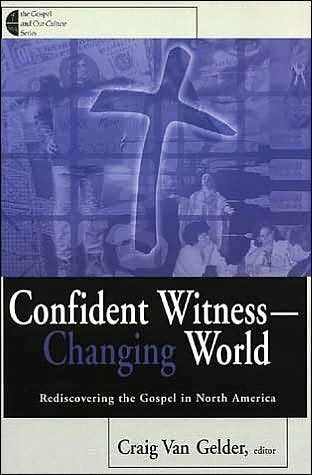Craig Van Gelder, Confident Witness – Changing World: Rediscovering the Gospel in North America. Eerdmans, 1999.
Referenced in: Missional Philosophy
LifeandLeadership.com Summary
This is part of the Gospel and Our Culture series published by Eerdmans in association with the Gospel and Our Culture Network. It is a collection of essays from scholars and practitioners on how churches in North America may become more missional in the post-Christendom era. It is less academic and more accessible than other volumes in the GOCN series, targeted more to ministers. Highlighted below are the contents I find most helfpul.
Part One addresses the issue of the characteristics of the North American mission field. Typical of missional material, the first chapter by Richard Mouw describes the new missionary context, but is also an exhortation to take this seriously in the spirit of the Apostle Paul’s engagement with Athens (Acts 17). Mouw encourages us to look at the world with the heart of a missionary. The remaining chapters address how to translate this missionary spirit to address the needs of our fragmented culture, the realities of the digital age, and the characteristics of the postmodern ethos as reflected in movies.
Part Two takes up the issue of how the church engages the missionary context. Douglas John Hall describes the metamorphosis with a quote from the Catholic theologian Karl Rahner:
“My thesis is this: In so far as our outlook is really based on today, and looking towards tomorrow, the present situation of Christians can be characterized as that of a diaspora; and this signifies a ‘must’ from which we may and must draw conclusions about our behavior as Christians. …If we once have the courage to give up our defence of the old facades which have nothing or very little behind them; if we cease to maintain, in public, the pretense of a universal Christendom; if we stop straining every nerve to get everybody baptized, to get everybody married in church and onto our registers (even when success means only, at bottom, a victory for tradition, custom and ancestry, not for true faith and interior conviction); if, by letting all this go, we visibly relieve Christianity of the burdensome impression that it accepts responsibility for everything that goes on under this Christian top-dressing, the impression that Christianity is…a sort of Everyman’s Religious Varnish, a folk-religion (at the same level as that of folk-costumes) – then we can be free for real missionary adventure and apostolic self-confidence. We still have not fully wakened from our dream of a homogenous Christian West. If often leads us to react furiously and in a false context and with inappropriate means, to realize this dream-ideal, and so apply ourselves to the wrong point altogether.” (67)
He suggests that we acknowledge the immense transformation of the Christian movement intentionally, primarily through becoming more serious about theology, our own distinctive spiritual and intellectual foundations. The remaining chapters of section two discuss how this approach is instructive for urban churches, the challenges of syncretism, and the task of congregations shaping their identities.
Part three discusses how to understand the gospel in the new North American Mission Context. The authors suggest that historically, when the church experiences shifts as seismic as ours, it is because the “people believe that the gospel has become overlaid with cultural accretions that distort its original power and vitality.” (128) He contrasts how early Christianity “focused upon and preoccupied itself with the offense” of the crucifixion. (133) He suggests this counter-cultural thrust has implications for the way we think about God and the ways we contextualize the gospel. Stephen Bevans describes four models of interaction between church and context that might be used in a missional church in North America. Lee Wyatt offers insight on how to preach to postmodern people.
Other chapters in parts four and five are helpful, but are more completely developed in other resources. For example, the article by Alan Roxburgh on being the church in the postmodern era is fleshed out in Introducing the Missional Church, and the article on worship by Marva Dawn, Reaching Out Without Dumbing Down is expounded upon her book by the same title.
This anthology provides brief introductory exposure to a variety of subjects. Anyone who has access to it could select the chapters that are most useful for their contexts.
From the Publisher
How do we make the gospel clear and the church relevant to the postmodern, post-Christian culture in North America? Confident Witness, Changing World seeks to answer this question in practical terms immediately useful to educators and pastors.
Written by twenty-one scholars who are also skilled in doing frontline ministry, this volume discusses the radical cultural shift that has reshaped North America, one of today’s most important mission fields, and explores fresh methods for presenting the gospel with confidence amid the challenges presented by our contemporary context.
About the Editor
Craig Van Gelder is professor of congregational mission at Luther Seminary, St. Paul, Minnesota.
***For additional information on this resource, including reviews, click the bookstore links. Check the reference at page top or the links below for resource guides on related topics.***
Related Ministry Resource Guides:
- Missional Perspectives 01, Introduction
- Missional Church Resources, Introduction and Index
- Missional Philosophy
- Theology of Mission
- Missional Communities
- Missional Leadership / Missional Strategies
- Missional Lifestyle, Discipleship, Spirituality
- Church Leadership and Renewal, Index to Resources
- Ecclesiology
- Evangelism
See Resources on Over 100 Areas of Ministry Leadership:


